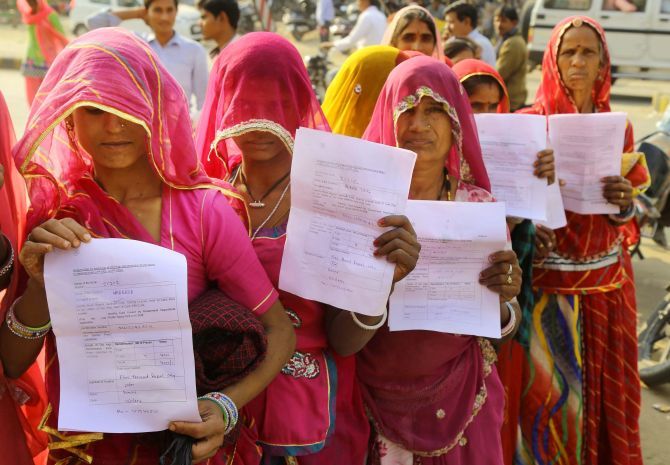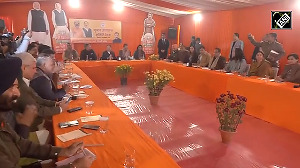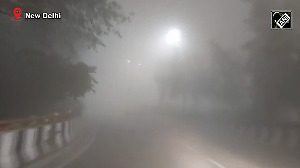The move would help the PM Modi shape a women-centric narrative, says Archis Mohan.

In an effort to seize back the political narrative that is slipping away because of steep oil prices, lack of job growth and economic downturn, the Narendra Modi government is mulling bringing the Women's Reservation Bill in the winter session of Parliament.
The Bill provides for reserving a third of all seats for women in the Lok Sabha and state legislative assemblies, including in the seats reserved for Scheduled Castes and Scheduled Tribes.
The Bill has had a tortuous history. It was first introduced in 1996, and lapsed thrice with the dissolution of the respective Lok Sabhas.
It was passed by the Rajya Sabha in 2010 during the Congress-led United Progressive Alliance II regime.
Its passage in the Lok Sabha was resisted by allies of the Congress. But unlike the Lok Sabha, the Rajya Sabha is a continuous House and the Bill is pending in the House.
Sources said a final decision is yet to be taken but consultations are on and the leadership is keen to build on the Prime Minister's 'Beti Bachao, Beti Padhao' campaign and the positivity generated with appointing Nirmala Sitharaman as the Defence Minister of the country.
The Bill is likely to see resistance from within the party since it could mean several of the sitting party members having to lose their seats, but during his years as the chief minister of Gujarat, Narendra Modi was known to replace at least a third of the party's sitting legislators to beat anti-incumbency.
The move would help the PM Modi shape a women-centric narrative.
Modi led the Bharatiya Janata Party to a famous victory in 2014 on the back of a narrative that articulated the hopes and aspirations of the youth.
For the 2019 polls, the Modi government believes that as part of its pro-poor focus, it should focus on schemes that help empower women.
The BJP's election manifesto for the 2014 Lok Sabha polls had said, 'The party is committed to 33 per cent reservation in parliamentary and state assemblies through a constitutional amendment.'
The BJP's win in the Uttar Pradesh assembly polls has emboldened the top leadership to pursue a pro-women agenda.
The PM and BJP chief Amit Shah had publicly stated the contribution of the effective rollout of the Ujjwala scheme, which provided cooking gas cylinders to poor families, in the party's electoral victory in UP.
Other pro-women measures, the party believes, have been opening of zero balance accounts, cash transfers instead of ration and maternity benefits.
A BJP committee headed by party vice-president Vinay Sahasrabuddhe has also studied various schemes, particularly women-centric schemes, in BJP ruled states like Madhya Pradesh and recommended other states should replicate it.
The BJP has also drawn lessons from the Nitish Kumar-led Bihar government's women-centric schemes.
According to the Lok Sabha website, 63 of the 543 members of the House, that is 11.67 per cent, are women.
Women representation in state assemblies is similarly low.
Image for representation only.












 © 2025 Rediff.com -
© 2025 Rediff.com -